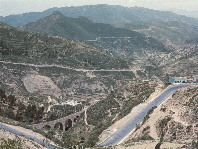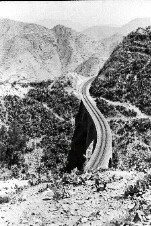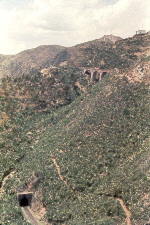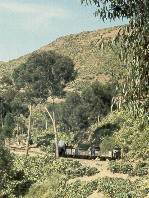Soon our trolley went over a ridge and began down a valley. The sound of the engine died down as we began to gain speed. Then to my surprise (I don't know why because I knew it was working like a road vehicle) the engineer revved the engine, ground the gears into a lower gear, and released the equivalent of a clutch. The car lurched a bit as the engine began to break our descent just like trucks do on steep hills. We seldom got out of that lower gear until we were far below on the flats.

Mai Hizni Valley and beyond
(Debra Bizan Monastery, above Nefasit, is on the far
mountain)
Before long we broke into the great valley of the Mai Hizni (Hizni River) and soon crossed one of the most beautiful stone archway bridges I have ever seen.
My only regret was that I was not up on the road watching us cross. I could almost feel the flow of its gentle "S" curve.

Shortly we passed through the "Porta dal Diavolo," the Devil's doorway, so named by the Italians. What a site! On the left nothing separated us from the floor of Dorfu Valley two thousand feet below. This valley is the first great rent in the earth's crust at the western side of Africa's Great Rift Valley at this point. The wall of the Asmara plateau stands to the left of the valley.
The Americans called this valley "Python Valley" because of the great, winding, dry river bed that snaked down its center. The picture at the opening of this article shows a view of both Python Valley and the railway with this point with the third-class train engine rounding the mountain on its way to Asmara.
Clinging to the vertical side of a low peak, we left Dorfu Valley, made a complete 180-degree turn, and headed back south below where we had been only a short time before. In the middle of a delightfully green eucalyptus grove the Littorina stopped for at Dorfu station to pick up and drop off no one. It left as soon as the driver realized the same.

| 
|
below where we had been only a short time before." | and its eucalyptus trees |
The trees here and a bit lower around Arbaroba were unusual on this tree-starved mountain complex. The people of Asmara had long since appropriated the trees for firewood leaving a landscape of mostly Prickly Pear cactus. The Dorfu and Arbaroba groves appeared young. It seemed that whoever planted them had the clout to protect them too.
Traveling out and around and back and forth we managed two more 180s before we began winding down the east wall of the Mai Hizni valley. Standing on the road above my beautiful S-turn bridge, you could count five layers of track in this valley.